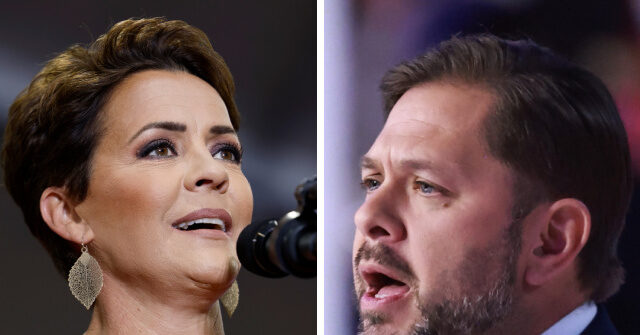In a recent U.S. Senate debate in Arizona, Kari Lake, the Republican candidate and former news anchor, took aim at her opponent, Congressman Ruben Gallego, regarding his stance on the border wall. The debate highlighted a significant shift in Gallego’s position, as he moved from previously deriding the border wall as “dumb” and “stupid” during the Trump administration to now claiming that “a border wall is important” for southern border security. Lake seized the opportunity to call out this inconsistency, presenting evidence of Gallego’s past statements as a means to illustrate his change of heart, which she characterized as a troubling flip-flop.
Lake’s critique was grounded in specific references to Gallego’s legislative history, which included an op-ed titled “Why we should not build Trump’s border wall,” where he argued that the wall aimed to address a problem that did not exist. This history was particularly poignant as Lake framed Gallego’s current claims about supporting a border wall as a disingenuous attempt to position himself as moderate. Her emphasis on Gallego’s previous criticisms served to reinforce her argument that he could not be trusted on border security issues, claiming that he was attempting to present a rebranded version of himself to voters.
Citing her long tenure as a journalist covering Arizona’s border issues, Lake momentarily shifted the debate to her experiences, positioning herself as someone who understands the challenges and realities of border security better than Gallego. She pointed out that under President Trump, actual progress was made in securing the border, especially highlighting Gallego’s opposition to funding for the border wall at a time when the former president was in office. This narrative allowed Lake to assert that Gallego and others like him were part of a longstanding cycle of failed promises made by career politicians concerning border security.
Furthermore, Lake criticized Gallego for promoting a Democratic immigration bill that she argued would have detrimental effects on border security. She explicitly rejected the notion that the bill was bipartisan, countering that it would essentially allow 5,000 illegal crossings every day. This criticism not only underscored her belief in stricter immigration control but also positioned her as a candidate committed to preventing what she described as an overwhelming influx of illegal immigration, contrasting sharply with Gallego’s more lenient approach.
The debate underscored a broader narrative within the political landscape of Arizona, where debates over immigration and border security have become fiercely contested issues. Lake strategically aligned herself with the narrative of security and safety, which resonated with many voters who prioritize these issues. Meanwhile, Gallego’s attempts at reframing his stance were framed by Lake as capitulation, a tactical move that could potentially alienate voters who remember his previous harsh criticisms of the wall.
Ultimately, the exchange served not just as a clash of opinions on immigration policy, but also as a reflection of the broader political strategy each candidate employs. For Lake, it was an opportunity to rally support from those who feel frustrated with the current state of border security and to define herself as a hardline candidate in contrast to what she portrayed as Gallego’s wavering convictions. The debate thus encapsulated the considerable stakes involved in this Senate race, as candidates navigate complex legislative histories and seek to establish credibility and connect with their constituents on these critical issues.

